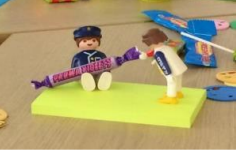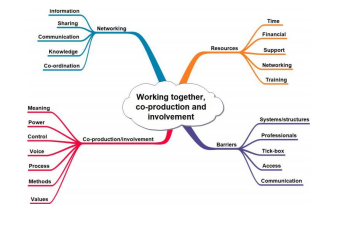Support for women experiencing depression and mental illness accross Sheffield & South Yorkshire
Home Services Fundraising Events Co-Production Jobs/Volunteering Other Information

Support for women experiencing depression and mental illness accross Sheffield & South Yorkshire
Home Services Fundraising Events Co-Production Jobs/Volunteering Other Information

Co-production is when an individual or group of individuals influence the support they receive, in a environment that has equaility and impact.
At SODIT, coproduction is very important to us. We believe it is important because it allows the service we offer to be shaped and improved by the people that use it. This enables us to be responsive to the needs of the community. We held our first “exploration of co-production” workshop, held at The Circle with a near full house of attendees! It proved to be very helpful in gauging what we think qualifies as “co-pro” and how we envision it looking in the future.
We have delivered all our co production workshops over 2021 ( and covid ) online. Report HERE soon !
Here is a blog post and a co-pro video from Chrys, who is a member of our peer group and helped to cofacilitate our workshop.
A few words on Co-Production in a Changing World
I’ve been struggling to write something on this for over a week now… … it feels ironic, trying to express the value of collaboration and co-creativity, sitting alone in my kitchen with just my laptop for company, amidst the alarming unfolding of the coronavirus pandemic.
Here we all are, in our islands/bubbles/shelters or on the front-line, with whatever levels of comfort, privilege, safety or danger this affords us. Some, like myself, having time to reflect on our lives, needs and coping strategies whilst global catastrophe breaks out around us.
At the beginning of the year, there was much talk about the possibilities for positive social and environmental change resulting from the challenges of the pandemic, yet, as things play out, the sheer overwhelm of deficits in basic care, PPE provision, social inequalities, racism and exploitative employment practices , combined with a level of mortal fear as public health infrastructures are shockingly mismanaged, make it hard to hold onto visions of collective action for positive change.
I find I am experiencing deep soul searching, some personal healing, moments of fear and sadness.. moments of love & gratitude…. and a lot of time to think.. worry.. grieve.. and think some more…!
So, what of Co-Production?
As dialogue turns to monologue, here are some thoughts from me:
I first heard of Co-Production when visiting ‘Survivor’s of Depression in Transition’ (Sodit) , a Sheffield based, all-women mental health support project. Like many before me, I arrived on the Sodit sofa with a wealth of unsatisfactory experiences regarding mental health support for intelligent, partially-empowered women who have survived complex trauma.
Sodit offers a space for women to share stories and affirm survivor strengths.
So, there I sat, on the purple sofa, accepting tea, spitting pins and airing stories. There were nods of recognition, robust sighs and even exasperated laughter. .. and the planting of seeds… (metaphorically, that is, it’s on an industrial estate in Tinsley, so no allotment out the back of this site!…) …but seeds of ideas were scattered… watered …. maybe even encouraged.
I’m also a Dramatherapist. I worked in education, schools and special educational needs settings for thirteen years until my unmet support needs caught up with me and, unable to access the support I needed, I found myself engaged in an in-depth experiential “course” in the inadequacies of mental health support provision as mentioned above!
Unfortunately, my story is not unusual.
It results, I believe, from a shift in mental health practice over several decades. Whilst, on a surface level, at least, there is greater visibility and attempts to lessen shame and stigmatisation around mental distress, this has not been met with sufficient resources to respond with the necessary skill, depth and sensitivity that authentic therapeutic work requires. Budget cuts and service limitations result in quick-fix pseudo solutions that, at best, help only partially and, too often, leave so-called “ clients” feeling worse.
The movements to open up debate and conversations around mental distress and illness have fallen into traps of individualisation, off-the-peg pathological identities and, too often, a superficial and inadequate approach to the complex and delicate task of therapeutic work.
So,… What of Co-production?
Arriving to this discussion recently, with both my professional and “would-have-been-aservice-user-if-there-were-any-quality-sevices-to-use” perspectives; I believe the following questions are crucial for the concepts of Co-Production to make meaningful and authentic improvements to health and social care.
Chrystine Moon June 2020
Chrystine Moon BA(hons) PGCE PGDipDth is a survivor of complex trauma, a Dramatherapist, a member of the LGBT+ and feminist communities, a sibling carer and freelance performer and singer-songwriter.
Here is Steph’s words on co-pro. Steph is founder and CEO of SODIT and member if the SCIE co production steering group.
“Now is not the time to be reductive” – be more Playmobil!
The theme for this year’s co production week is very much on trend, a changing world, and even before the covid19 pandemic there was an uprising of change and unrest. The irony has not been lost , in fact the start of this year as a small user led organization based in Sheffield (ii) Survivors of Depression In Transition , we had planned a whole programme of ‘exploring communities and coproduction’ workshops with a local festival to coincide with the SCIE week!
We managed to deliver one session before the ‘lockdown’ and then sadly postponed until 2021. Yes we had given the virtual world of delivery some thought , but concluded that we would not have the connectivity , human responses or collective reciprocity that we desired and needed to demonstrate the core principles of genuine co production.
Why were we developing this in the first place? Well , while we have some local pockets of good practice, the whole system doesn’t and we, while small, wanted to help support everyone in understanding what this co production was all about and how to go out and make it happen. The basis of this mission has been in part, due to the work we carried out with Challenge Sheffield, from a small pot of funding from Sheffield Healthwatch speak up grants.
We created a space where people could feel comfortable and safe to use those tools such as toy figures, Playdoh and pipe cleaners. Giving peoples expressive and visual imaginations to flourish and so producing rich feedback and comments for the report.
The three themes were – Experience of services; Working together, co-production and involvement and Community raised similar issues.
The following recommendations were made from the Sheffield Mental Health Challenge Day:
These challenges continue and ironically, we need this even more, and we should not let genuine co production be dropped or forgotten as we focus on the national crisis and are apparently ‘led’ by elected politicians and scientists. Black lives matter & LGBTIQ+ are more vocal than ever, and we must create a parallel for co-production.
“NO”, we the people demand to be heard and seen as partners with an equal platform to create a better world which gives people , families & communities strength and influence in the places we live and work in!
References

